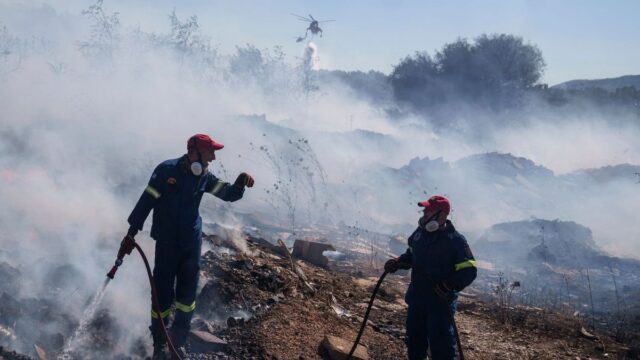“The Mediterranean is a hot spot for the climate crisis,” says Kostas Lagouvardos of the National Observatory of Athens.
Greece has suffered this month the earliest heat wave which is known to have caused several deaths and the closure of schools and tourist attractions.
Temperatures have dropped just below official threshold of 38 ºCbut there is no expected respite for the rest of the summer.
There is no doubt that the Mediterranean country is on the front line of man-made climate change in Europe. Last year he suffered a heat wave unprecedented that lasted 16 days and caused the biggest forest fire in history of the EU: between July and August an area twice the size of Athens burned. At least 28 people died and dozens were injured.
The Greeks barely had time to catch their breath before the deadly floods September, in which some areas received a year’s worth of rainfall from Storm Daniel in a single day.
As you prepare for another season of extreme climate change,What are the reasons why Greece is so affected?? To find out, we spoke with climatologist Kostas Lagouvardos, research director at the National Observatory of Athens (NOA).
The Mediterranean is the European region that warms the fastest
We know that Europe is the fastest warming continent in the world, with temperatures rising approximately twice as fast as the global average. This is confirmed by a recent report from the UN World Meteorological Organization and the European Union climate agency, Copernicus.
According to Copernicus, in summer warming is most pronounced in central and southeastern Europe and around the Mediterranean.
“The Mediterranean is a hot spot for the climate crisis“Lagouvardos tells ‘Euronews Green’, pointing out that southern Italy, Cyprus, Turkey and North African countries are also greatly affected by the rising heat.
The eastern part of the Mediterranean is warming up especially quickly, Add. Over the past 30 to 40 years, NOA research shows that the global temperature increase in Greece exceeds 1.5 ºCa very big leap for such a short time.
How do other climatic factors affect Greece?
Greece has the longest coastline in the Mediterranean, once its thousands of islands in the Aegean, Ionian and Mediterranean seas and the Sea of Crete have been unraveled.
“The existence of many islands exposed to the sea makes it more vulnerable“, explains Lagouvardos, especially to the strong winds. The country is an unusual mosaic of land and sea.
Heat waves and marine cyclones break a new record
“We have a system that works together – the sea, the air – and As one of the components of this system heats up, it then heats up the other.“explains Dr. Lagouvardos.
This happened last year, when the summer heat wave raised the Mediterranean waters to a new record.
Cyclogenesis refers to the formation of cyclones and other low pressure systems over the sea. “A very bad example” of this occurred in September 2023 in the form of the storm danielwhich brought an overwhelming amount of precipitation to the continent.
Dry winds create perfect storm for wildfires
Greece’s proximity to Africa means that spells of Warm winds often make their way across the ocean. This was the case earlier this month, with warm, dusty winds from North Africa fueling the heat wave.
Now, the country is experiencing strong and dry winds of the north, known as etesios, which blow across the Aegean Sea, mainly affecting the islands and eastern areas, including Athens. They usually dominate in July and August, but now they also appear earlier, in June.
That’s a problem, explains Dr. Lagouvardos, because Combination of hot, dry conditions and strong winds creates ‘worst case scenario’ for forest fires.
If Greece must be distinguished from other Mediterranean countries in terms of climate impacts, according to the scientist, it is this number of forest fires, which is disproportionately high.
Experts are studying a number of forest management solutions and techniques to deal with this annual phenomenon, including use of technology such as drones and temperature sensors.
Extreme weather events have increased in Greece
To better assess how his country’s climate is changing, Lagouvardos founded and coordinates a network of hundreds of surface weather stations automated throughout Greece.
These stations help provide more localized heat alerts and track trends in areas of the country that are warming the fastest. In fact, it is not the south of Greecebut the northwestern parts of the country – far from the sea – which have a greater tendency to warm in the last 30 years, he says.
The NOA also monitors extreme weather events, which it classifies as those that cause significant social and economic impact. Between 2000 and 2009, 60 phenomena of this type occurred, which increased by 50% to 90 between 2010 and 2019.
In 2021, in response to the devastating forest fires That summer, Greece created the Ministry of Climate Crisis and Civil Protection.
Reflecting the country’s frontline position, politicians tend to speak in much harsher terms about the crisis than many of their northern European counterparts.
“Greece faces war in peacetime“Prime Minister Kyriakos Mitsotakis said last year. “The climate crisis is here and it forces us to see everything differently.”







